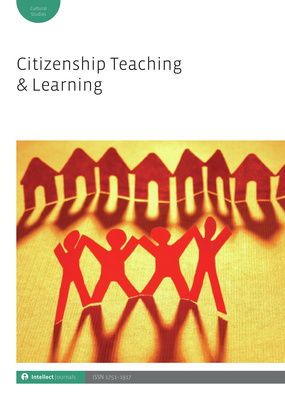
Citizenship Teaching and Learning 17.1 is out now!
Intellect is pleased to announce that Citizenship, Teaching & Learning 17.1 is out now!
For more information about the journal and issue click here>>
https://www.intellectbooks.com/citizenship-teaching-learning
Aims & Scope
Citizenship Teaching & Learning is global in scope, exploring issues of social and moral responsibility, community involvement and political literacy. It advances academic and professional understandings within a broad characterization of education, focusing on a wide range of issues including identity, diversity, equality and social justice within social, moral, political and cultural contexts.
Issue 17.1
Editorial
Democratic citizenship education reimagined: A renewed focus on exclusions
YUSEF WAGHID
Articles
Ethnic minority identities and citizenship in a Chinese-dominant society: Theoretical and institutional frameworks
MIRON KUMAR BHOWMIK, KERRY J. KENNEDY, MING-TAK HUE AND HOI-YU NG
ZAYD WAGHID AND KRYSTLE ONTONG
Citizenship types, social media use and speaking a foreign language as predictors of global competence
EMIN KILINÇ AND BULENT TARMAN
GHAZAL SHAIKH
Voluntary non-formal teacher professional learning for democratic peacebuilding citizenship education: A participatory approach
YOMNA R. AWAD
A ‘requiem’ for global citizenship education in higher education? An analysis of the exclusive nationalistic response to the COVID-19 pandemic
JOSEPH PARDON HUNGWE
ALEKSANDRA FURMAN, DAGMARA SZCZEPAŃSKA AND DOMINIKA MAISON
Musical citizenship as a means to disrupt exclusions: Potentials and limitations as understood in times of a pandemic
CHRYSI KYRATSOU

